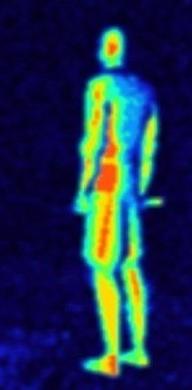(单词翻译:单击)
听力文本
This is Scientific American — 60-Second Science. I'm Christopher Intagliata.
One of the most exquisite heat sensors in the world—it's not in some government lab. It's in the head of a snake. The pit viper, to be specific.
"They're incredibly sensitive. They beat any of the synthetic counterparts, even the most expensive semiconducting systems used in infrared or thermal cameras today." Chiara Daraio, a materials scientist at Caltech. "They can effectively resolve a few millikelvin of temperature changes at a distance of up to a meter."
Now Daraio and her colleagues have designed a heat-sensing material that competes with the sensitivity of the snake. Using pectin. Same stuff you used to thicken jam. “Pectin, a double-stranded molecule ubiquitously present in the outer cell wall of plant cells, acts effectively as a tiny molecular temperature sensor." When temperatures go up, she says, the double-stranded molecule unzips, "like the zipper of a jacket."

So they did what you usually do with pectin—they made jelly, using pectin, water and calcium ions. They dried that out, and got a thin, transparent film. Then, they had to test it. Which they realized they could do using a microwave and her son's teddy bear. "Which can be heated up to a temperature of 37 degrees, roughly the temperature of a mouse or a running prey for a snake."
And the pectin film was exquisitely sensitive to the warmed-up teddy bear—on par with the snake. The film could detect temperature changes as small as 10-thousandths of a degree celsius. The study is in the journal Science Robotics.
Daraio says the skin could give robots superior sensing abilities. "Allowing for example robots to determine whether they're moving around inanimate objects, other robots, or even humans or animals, which are evidently warmer bodies." Or, she says, it could be used in sensitive skin on prosthetic limbs for humans. If we can figure out how to connect this artificial skin up to something far more complicated. The brain.
Thanks for listening for Scientific American — 60-Second Science Science. I'm Christopher Intagliata.
参考译文
这里是科学美国人——60秒科学。我是克里斯托弗·因塔利亚塔。
世界上最敏锐的热传感器之一不是在政府的实验室里,而是在蛇的头里。具体来讲是在响尾蛇的头里。
“蛇头里的热传感器非常灵敏。它们可以击败任何人造热传感器,甚至能与现在应用到红外摄像机或热感摄像机上的最昂贵半导体系统相媲美。”加州理工学院的材料科学家奇亚拉·达拉里奥说。“在最远一米的距离以内,它们可以有效识别几毫开尔文的温度变化。”
达拉里奥和她的同事设计了一种热敏感材料,这种材料可以与蛇的敏感性相匹敌。该材料使用果胶制造而成,果胶就是用来增加果酱稠度的物质。“果胶是一种普遍存在于植物细胞壁外部的一种双链分子,实际上相当于微型分子温度传感器。” 她说,当温度上升时,双链分子就会像“夹克拉链一样”拉开。
他们用果胶、水和钙离子制作了果冻,就像你通常用果胶做的一样。他们把果冻风干后,得到一张透明薄膜。然后,他们对这层薄膜进行测试。他们意识到可以用微波炉和她儿子的泰迪熊进行测试。“可以把泰迪熊加热到37度,对蛇来说这一温度相当于一只老鼠或一个奔跑中的猎物的温度。”
果胶薄膜对加热后的泰迪熊相当敏感——和蛇一样。这层薄膜可以检测到小至千分之十摄氏度的温度变化。这项研究结果发表在《科学·机器人学》期刊上。
达拉里奥表示,这种薄膜能赋予机器人卓越的感知能力。“比如,这一薄膜能使机器人确定它们正在围绕什么物体运动,是无生命物体、其他机器人、还是人类或动物,因为人类和动物的体温明显更高。”她说,这种薄膜还能应用于人类假肢的敏感皮肤上。如果我们能弄清如何将这种人造薄膜和更复杂的事物联系起来,那我们绝对是智慧者。
谢谢大家收听科学美国人——60秒科学。我是克里斯托弗·因塔利亚塔。
译文为可可英语翻译,未经授权请勿转载!
重点讲解
重点讲解:
1. dry out (使)变干;(使)干透;
例句:If the soil is allowed to dry out the tree could die.
如果任由土壤变干,这棵树可能会枯死。
2. heat up 加热;
例句:It took a long time to heat up the stove.
加热炉子花了很长一段时间。
3. on par with 与…平分秋色;与…势均力敌,不分上下;
例句:A study showed the devices are on par with traditional mechanical treatment facilities for removing organic compounds and nitrogen .
研究显示,在消除有机化合物和氮含量方面,该设备与传统机械处理设施的处理能力相当。
4. connect up 使连接,使接通;
例句:There's an enormous need within an economy, within the marketplace, to help buyers connect up with sellers.
对于任何一个经济体而言,都有对于交易场所的需求,以帮助买家和卖家取得联系。


